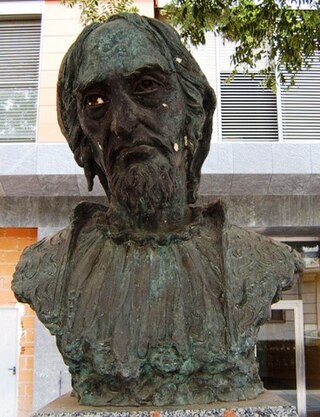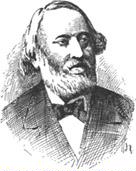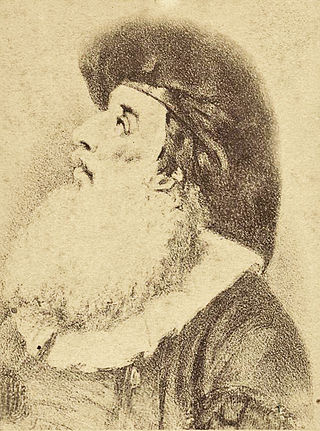Related Research Articles
Jacob ben Abba Mari ben Simson Anatoli was a translator of Arabic texts to Hebrew. He was invited to Naples by Frederick II. Under this royal patronage, and in association with Michael Scot, Anatoli made Arabic learning accessible to Western readers. Among his most important works were translations of texts by Averroes.

Moses de León, known in Hebrew as Moshe ben Shem-Tov, was a Spanish rabbi and Kabbalist who first publicized the Zohar. Modern scholars believe the Zohar is his own work, despite his claim that he took traditions going back to Shimon bar Yochai and committed them to writing. His other works include Sefer ha-Rimon, written in Hebrew, and hundreds of pseudepigraphic responsa, commentaries, and Kabbalistic tracts which he falsely attributed to earlier authorities.
Paulus Aemilius was a Hebrew bibliographer, publisher, and teacher associated with the University of Ingolstadt
David ben Naphtali Fränkel or David Hirschel Fränkel, was a German rabbi.
Jacob ben Reuben was a Karaite scholar and Bible exegete of the eleventh century. He wrote a brief Hebrew language commentary on the entire Bible, which he entitled Sefer ha-'Osher, because, as he says in the introduction, the reader will find therein sufficient information, and will not need to have recourse to the many voluminous commentaries which the author himself had consulted. The book is, in fact, merely a compilation; the author's explanation of any given passage is frequently introduced by the abbreviations or ; and divergent explanations of other commentators are added one after the other and preceded by the vague phrase. It is, in fact, chiefly an extract of Yefet ben Ali's work, from whom Jacob borrowed most of his explanations as well as the quotations from various authors, chiefly on the Pentateuch. But Jacob also drew upon later Karaite authors, the last of whom is Jeshua ben Judah, who, so far as is known, flourished about 1054. This date points to the second half of the eleventh century as the date of composition of the Sefer ha-'Osher.

David Cassel was a German historian and Jewish theologian.
Abraham Saba (1440–1508) was a preacher in Castile who became a pupil of Isaac de Leon. At the time of the expulsion of the Jews from Spain he took refuge in Portugal, where he met with further misfortune; for scarcely had he settled in Oporto when King Manuel I of Portugal ordered all Jews to be expelled from Portugal, all Jewish children to become Christians, and all Hebrew books to be burned. Saba's two sons were forcibly taken from him, and he fled from Oporto, abandoning his entire library and succeeding only at the risk of his life in saving his own works in manuscript.
Aaron ben Isaac Lapapa was an Oriental rabbi and Talmudist. He was at first rabbi at Manissa, Turkey, and at an advanced age was called to Smyrna as judge in civil affairs. In 1665, when the Sabbatai Zevi movement was at its height there, he was one of the few rabbis who had the courage to oppose the false prophet and excommunicate him. Sabbatai Zevi and his adherents retorted by deposing him and forcing him to leave the city, and his office was given to his colleague, Ḥayyim Benveniste, at that time one of Sabbatai's followers. After Sabbatai's conversion to Islam, Lapapa seems to have been reinstated.
Joseph ben Shem-Tov ibn Shem-Tov was a prolific Judæo-Spanish writer born in Castile. He lived in various cities of Spain: Medina del Campo de Leon (1441); Alcalá de Henares (1451); and Segovia (1454).
Shem Tov ibn Shem Tov was a Spanish kabbalist and fierce opponent of rationalistic philosophy.
Isaac ben Samuel of Acre was a Jewish kabbalist who fled to Spain.
Munabbih ibn Kamil ibn Sij ibn Dhi Kibar Abu-Abdullah al-Yamani al-San'ani was a companion of Muhammad.

Naphtali Cohen (1649–1718), also known as Naphtali HaKohen Katz, was a Russo-German rabbi and kabalist born in Ostrowo in Ukraine. He belonged to a family of rabbis in Ostrowo, where his father, Isaac Cohen, a great-great-grandson of the Judah Loew ben Bezalel, had fled during the Polish–Cossack–Tatar War.
Moses ben Mordecai Zacuto, also known by the Hebrew acronym RaMa"Z, was a rabbi, Kabbalist, and poet. Zacuto, who was born into a Portuguese Marrano family in Amsterdam, studied Jewish subjects under Saul Levi Morteira. He also studied secular subjects, such as the Latin language. As a pupil of Morteira, he may also have been, as a youth still in Amsterdam, a fellow student of Baruch Spinoza.
Moses Najara II was a Jewish poet, son of Israel Najara, whom he succeeded as rabbi of Gaza. His poetry is praised by his contemporaries, but none of his poems is now extant.
David Friedrichsfeld was a German-Jewish writer in German and Hebrew.
Caleb Afendopolo was a Jewish polyhistor. He was the brother of Samuel ha-Ramati, ḥakam of the Karaite congregations in Constantinople and of Judah Bali, brother-in-law and disciple of Elijah Bashyatzi.
Abraham de Balmes ben Meir was an Italian Jewish physician and translator of the early 16th century.
Aaron ben Gershon Abu Al-Rabi of Catania was a Sicilian-Jewish scholar, cabalist, and astrologer of the 15th century.

The history of the Jews in Regensburg, Germany reaches back over 1,000 years. The Jews of Regensburg are part of Bavarian Jewry; Regensburg was the capital of the Upper Palatinate and formerly a free city of the German empire. The great age of the Jewish community in this city is indicated by the tradition that a Jewish colony existed there before the common era; it is undoubtedly the oldest Jewish settlement in Bavaria of which any records exist.
References
- Grätz, Gesch. der Juden, ix.48, 95, 161;
- Perles, in Revue Etudes Juives, i.299;
- idem, Beiträge zur Gesch. der Hebr. und Aramäischen Studien, Munich, 1884, pp. 154, 180;
- Steinschneider, in Hebräische Bibliographie, xxi.81.
 This article incorporates text from a publication now in the public domain : Singer, Isidore; et al., eds. (1901–1906). "Baruch of Benevento". The Jewish Encyclopedia . New York: Funk & Wagnalls.
This article incorporates text from a publication now in the public domain : Singer, Isidore; et al., eds. (1901–1906). "Baruch of Benevento". The Jewish Encyclopedia . New York: Funk & Wagnalls.